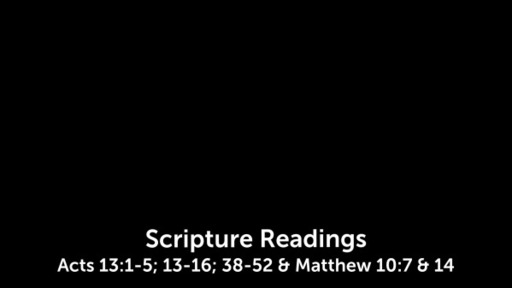By Water & Spirit

Sermon • Submitted • Presented • 25:16
0 ratings
· 13 viewsFiles
Notes
Transcript
TT: Judean Christians criticized Peter for joining with Gentiles.
When Peter returned to Jerusalem from Caesarea, he was criticized for eating with uncircumcised people.
Eating with uncircumcised people was forbidden for strictly observant Jews.
Eating with them could have sent a public message of their approval by Peter, thereby the Christian believers.
The Judean Christians assumed that someone had to be a part of the Jewish faith to become a Christian.
Ergo, accepting the same requirements of being added to the Jewish faith.
Circumcision was the most profound was to do that.
Other requirements included refraining from eating certain things or at certain times.
Yet another was to make sacrifices at the Temple during sacred festivals.
In the Hebrew Scriptures, what was defined as clean or unclean, sacred or profane, was important to understand how to live a righteous life under the Law of Moses.
Jesus was careful in his instructions to direct his disciples to those considered of the house of God.
Yet, the ministry of Jesus was, at times, extended to Samaritans and Gentiles.
The people that Peter visited had not held the tradition of circumcision as sacred.
So, they questioned Peter for eating with them.
Why had Peter violated the traditions that he had held so dear?
In sharing the breaking of bread, looked like sharing in the Lord’s Supper.
So, in a sense, they might have asked:
If these people were not willing to accept the burden of circumcision, why should they be given the same opportunity of salvation in Jesus Christ?
TW: When something new is started, there is often criticism.
Sometimes, we hold ourselves back from doing something new because it doesn’t fit familiar patterns.
Sometimes, we resist the work Spirit when we don’t understand what the Spirit is doing.
The Gospel is often withheld from people for many reasons, the worst of which is because we may think that they are not worthy of salvation.
Peter almost resisted the work of the Spirit that day.
GT: Peter told them that the Holy Spirit filled the Gentiles.
Peter could have been defensive or offended, but instead he relayed his experience point by point to the Judean believers.
He had seen a vision and heard God say to him not to call anything profane (or unclean), what God had called clean (or sacred).
God repeated the vision to make it clear.
Even then, Peter still had been puzzled about its meaning, but the Spirit had told him directly that Cornelius’ men looked for him and told him to go with them.
Even the, Peter was reluctant, asking the men what they wanted with him.
Cornelius, a Roman centurion from Caesarea, had sent for Peter as God directed him.
Cornelius was considered as a righteous man, though he was uncircumcised.
The Spirit had told him to go with them and to not discriminate between him and them.
Only when the men had confirmed what Peter had been told by the Spirit did he go, and he was smart enough to not go alone. He had six witnesses.
When Peter relayed the Gospel, all who were gathered received the fullness of the Holy Spirit coming upon them as on Pentecost.
Only then did Peter realize the full implication of the vision.
In releasing the burden of defining food as clean or unclean, God also released them from the burden of defining others that way.
Becoming a Jew by following religious tradition would not save the, they would only be saved by the grace of God.
God had been willing to go to those even the apostles were not readily willing to go to.
Jesus did not baptize with water but his disciples did.
The disciples continued to baptize with water & Spirit as Jesus commissioned them.
Baptizing with water outwardly symbolized the inward change of God’s gracious Spirit at work within them.
The Spirit filled believers, empowering them to keep the commands of Christ.
The chief commands of Christ are to love God and others.
The Spirit enables us to love others more fully.
More Spirit, More Love and Life.
GW: We need to be reminded that faith in Christ and the presence of the Holy Spirit unite us.
God goes out to those we do not expect, or are unwilling to go to.
We may be uncertain or not understand, but God does not require our understanding, God expects us to follow him in faith.
Stepping out in faith being guided by the Spirit opens doors.
The question is, how do we respond when God opens the door?
May we, like the early disciples decide to accept it and praise God.